
In celebration of Earth Day, Clean Air Council will be tabling and/or in attendance at the following events. We hope to see you there!
Environatal Day at Bartram’s Garden | April 17th 10-2pm
Join Nature Momz at Bartram’s Garden for an organized group walk along the trail to discuss maternal health, air quality, and the impact of the environment on mothers and infants. Free to all and no registration is required.
In partnership with the Philadelphia Regional Center for Children’s Environmental Health, Clear Air Council, Nurturely and a Place for Ummi Maternity Care.
Spring Fest at Bartram’s Garden | April 19th 10-2pm
Join Bartram’s Garden for their annual spring celebration! Activities will include a guided tour of the Garden’s 19th-century flower garden, a youth-led block printing activity, hands-on natural dye activity, an annual plant sale, and so much more. Clean Air Council will be tabling at the event, so stop by to learn more about the smoke contamination issue at Bartram’s Garden.
SEPTA’s Earth Day Celebration | April 21st 11-2pm
SEPTAs Sustainability Department is hosting its annual Earth Day Expo. Check out SEPTAs Zero Emission Fuel Cell buses, learn more about SEPTA’s sustainability practices, and visit Clean Air Councils table to learn more about our transportation programs.
Earth Day Expo at Temple University | April 22nd 11-3pm
Join the Office of Sustainability and TSG Sustainability Committee for an Earth Day Expo to learn more about sustainability on campus through student involvement, departmental research, and action plan development. Clean Air Council will be tabling at the Expo, so stop by to learn more about the Council’s transportation programs.
Swissvale Community Garden Earth Day Cleanup | April 22nd 6-8pm
Join the Swissvale Community Garden to help clean out garden beds and prepare for the growing season. Clean Air Council organizers will be in attendance to discuss our composting program and how to start composting.
Mt. Lebanon Earth Day Event 2025 | April 27th 11-3pm
Join us for live music, vendors, henna art, yoga classes, a kids bike course, and so much more at the Mt. Lebanon Earth Day Event. Stop by Clean Air Councils table to learn more about our programs in Southwest Pennsylvania.
“The Hub” is a weekly round-up of transportation related news in the Philadelphia area and beyond. Check back weekly to keep up-to-date on the issues Clean Air Council’s transportation staff finds important.

PhillyVoice: New SEPTA Regional Rail schedules take effect to improve service reliability – As of Sunday, the schedules of 13 regional rail lines have been adjusted to improve efficiency. These schedule changes, in addition to strategic staffing and maintenance crew deployments, aim to reduce delays and bolster service reliability. Image Source: PhillyVoice

The Inquirer: PATCO will stop running overnight trains to clean its stations – For six months this spring, PATCO will stop running overnight trains, from midnight to 4 a.m., on weekdays as its 13 stations are deep cleaned. The agency is coordinating with the city, social service organizations, and South Jersey municipalities to make stations cleaner and safer. Image Source: The Inquirer

NBC10: PATCO finally has reopening date for long-shuttered Franklin Square Station – On April 3rd, the renovated Franklin Square Station at 7th and Race will reopen for the first time in decades, expanding the PATCO line to 14 stations. Train service to the station will begin in the afternoon following a ceremony at noon. Image Source: The Inquirer
Other Stories
PhillyVoice: Market Street Bridge to close for 14 months starting August 2026 during $149 million rebuild
The Inquirer: Philly council members tabled a bill over concerns about bringing speed cameras to school zones
PhillyVoice: Reopening of MLK Drive Bridge pushed back to September after cold weather slowed repairs
NBC10: Lights go out in part of 30th Street Station, traffic lights outside also go down
StreetsBlog USA: What Will ‘Safe Streets and Road For All’ Mean Under Sec. Duffy?
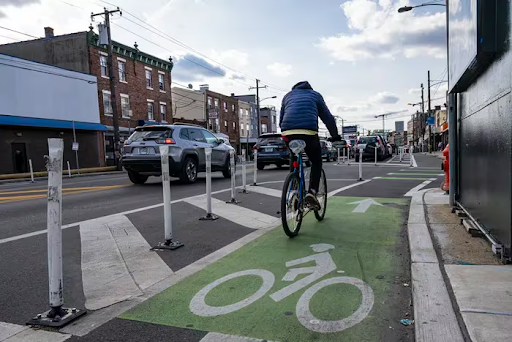
PennDOT released its annual transportation survey for all Pennsylvanians to complete. The survey asks participants about their transportation habits, what type and how they use transportation, and what improvements they want and how they want PennDOT to invest in the future.
Your feedback will be an important part of PennDOT’s 12-year Transportation Program update process along with other state and regional transportation plans. Sustainable modes of transportation are the best for the environment. Clean Air Council supports active sustainable modes of transportation. For more information on how to complete the survey, please visit https://bicyclecoalition.org/penndot-transportation-feedback-survey/.
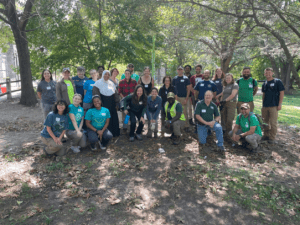
Monday September, 9th 2024 | Will Fraser
Clean Air Council recently held a trail maintenance workshop as part of our work with the Circuit Trails Maintenance Committee. The workshop was funded by We Conserve PA and DCNR was held at Cobbs Creek Community Environmental Center and offered community members, volunteers, and trail managers the opportunity to learn from local, regional, and national trail experts including Friends of the Wissahickon, Fairmount Park Conservancy, Morris County Parks Commission, National Park Service, and Appalachian Mountain Club.
The full day workshop was split into a morning classroom session and afternoon hands-on field session. Three specific maintenance topics were identified by a regional trail manager survey prior to the workshop: volunteer management, stormwater management, and vegetation management. Attendees learned basics on volunteer management including recruiting, training, and retaining volunteers and how to set up a volunteer day from start to finish including a breakdown in the types of tools used for trail maintenance. Workshop attendees learned about identifying common native and invasive plants and how to properly remove invasive plants with gloves and shears provided to them as part of the workshop. Participants also gained an understanding of ways in which stormwater can affect trails and learned how to identify stormwater runoff erosion and different solutions to prevent stormwater damage.
In addition to the workshop offering education on specific trail maintenance topics it also provided the opportunity for community members, trail managers and government and municipal partners to further connect on trail maintenance issues. Built-in breaks during the workshop allowed participants to discuss trail maintenance challenges and successes and share lessons learned from their experience while hearing from other attendees.
66tyThank you to We Conserve PA and the Pennsylvania Department of Conservation and Natural Resources for funding this workshop and to the speakers who brought their passion, skills, and expertise to the workshop. A special acknowledgement to Friends of the Wissahickon and Pennsylvania Recreation and Park Society for helping plan and organize the workshop and to Cobbs Creek Community Environmental Center for hosting.
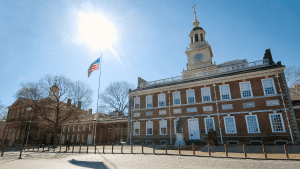
September 9, 2024
PHILADELPHIA, PA On Friday, after three years of requests and two years of litigation, the Federal District Court for the Eastern District of Pennsylvania ordered the National Park Service (NPS) to disclose to Clean Air Council key documents relating to the proposed federal investment in fossil fuel-fired heating equipment for buildings at Independence National Historical Park. The Council brought the lawsuit in 2022 to compel the federal government to produce documents in response to its Freedom of Information Act (FOIA) request.
This effort has been part of the longstanding campaign of the Council and partners to get Philadelphia Gas Works (PGW) to halt its drive to build more long-term methane gas infrastructure during the climate crisis. A diversification study was conducted in December 2021 presenting PGW with multiple options to convert Philadelphia to renewable energy.
“The power of sunshine laws, like the FOIA, allow us, the People, to make sure our government sincerely and correctly upholds laws that exist to protect the environment and public health,” said Lauren Otero, Clean Air Council staff attorney. “Federal decisions to lock itself into fossil fuel infrastructure for decades to come contradicts the Biden administration’s mandate to preserve a stable climate and undercuts our overdue need to reduce carbon emissions.”
NPS has 45 days to turn over to the Council feasibility studies and associated documents that claim gas-fired boilers are the best solution available to reduce carbon emissions. If NPS says it can’t separate out those materials from confidential or proprietary information, it will give them to the Court to review and then decide what to disclose.
“Given the climate crisis, new fossil-fuel heating is wrong for the City and wrong for the planet,” said Elaine Fultz, a member of Citizens’ Climate Lobby’s Philadelphia Chapter. “It would exacerbate global warming, worsen air quality in the Old City neighborhoods, and undercut both City and Federal targets for reducing carbon emissions. Philadelphia Gas Works must transition to the distribution of clean energy, and Philadelphia’s National Historical Park should be a leader, not a laggard, in the green transition.”
For a copy of the opinion, click here
For a copy of the order, click here.
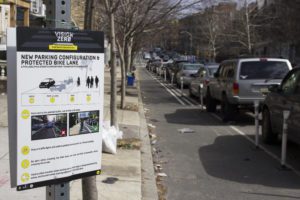
Clean Air Council joined the Bicycle Coalition and other Vision Zero Alliance advocates for a day of action on Tuesday, April 30th in Harrisburg. Advocates spoke to State Representatives and Senators about critical legislation needed to make streets safer for all road users.
If passed, this legislation would allow comprehensive integrated protected bike lane networks throughout Pennsylvania, create safe cycling and pedestrian spaces, and reduce dependence on automobiles. Protected bike lanes make bicycling safer, and are one of the best ways to protect pedestrians.
Pennsylvania State Senate Bill 565 (SB 565) and its companion House Bill 792 (HB 792) would allow pedestrian plazas and bike lanes on state roads to be separated and protected by parked cars. The bill was sponsored and introduced yesterday by 1st District State Senator Larry Farnese of Philadelphia.
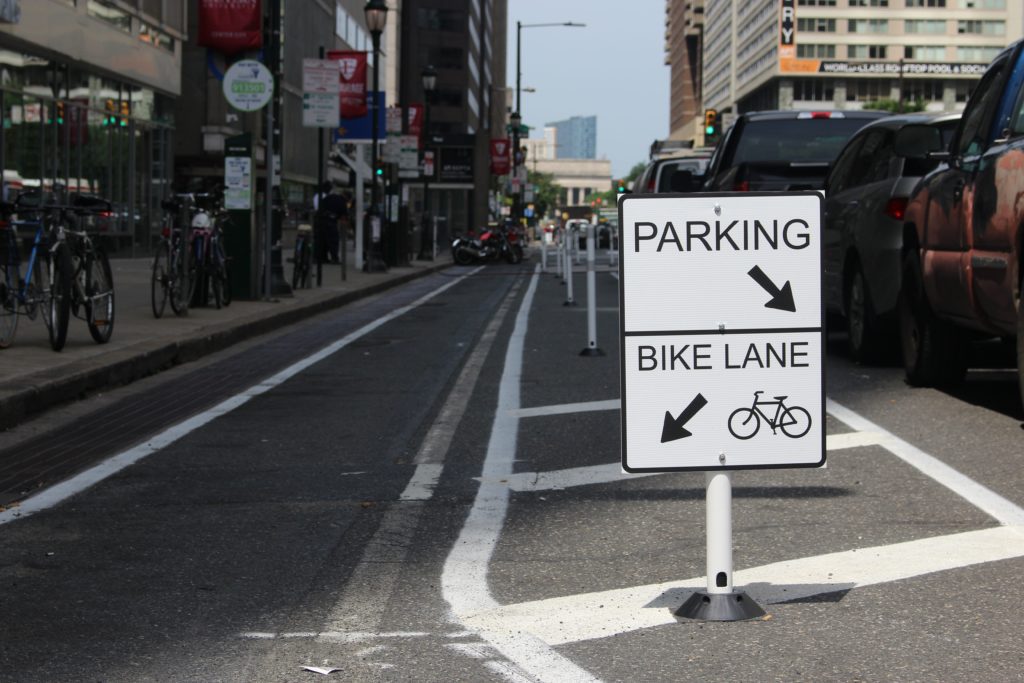
On state roads, pedestrians are 6.5 times more likely to die in crashes than non-pedestrians. While similar numbers of pedestrians involved crashes occur on local roads, 75% of pedestrian crashes that result in a fatal injury are on state roads. Protected bike lanes reduce traffic speeds by narrowing the road, calm intersections by reducing the turning radius, and create a shorter crossing distance for pedestrians.
House Bill 37, another important bill the Council advocates for, would ban hand-held cell phones while driving. The Fredricks family, whose daughter Emily was killed on her bicycle by a distracted driver while biking in the bike lane near 11th and Spruce Streets in Center City, spoke to legislators about their daughter and asked Senators and Representatives to pass legislation to prevent other families from experiencing similar tragedies. Distracted driving caused by cell phone use is a major cause of bicycling and pedestrian fatalities in Pennsylvania, and quadruples the risk of a crash. The Council asked legislators to join neighboring states New Jersey, Delaware, and Maryland in banning hand-held phones while driving.
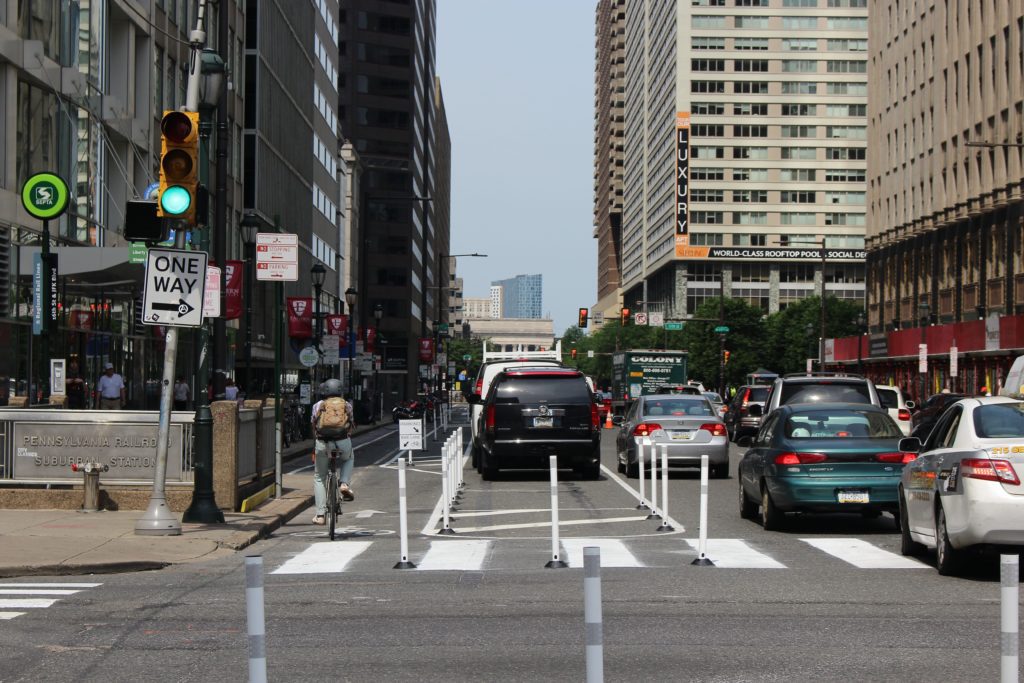
The Council also asked legislators to bring two bills to the floor that would have a major impact on road user safety. The first, a radar bill, (HB-1275) would allow municipal police to use radar technology. Pennsylvania is currently the only state in the country that does not allow municipal police from using radar to detect vehicle speeds. Speed is the largest predictor of how serious a crash can be. The difference of just 5 or 10 miles an hour can mean life or death.
Pennsylvania can more effectively slow drivers down by putting radar technology in hands of law enforcement across the Commonwealth. The second bill, yet to be introduced, would protect vulnerable road users including pedestrians, motorcyclists, horse and carriages, farm equipment, and others by requiring a minimum of four feet to pass. Many parts of the state do not have sidewalks, especially on the particularly dangerous state roads, and vulnerable road users must be afforded the protection of a minimum passing distance.
Creating safer roads for everyone is a common theme throughout all the bills presented to legislators on this day of action. Everyone has the right to travel safely, and a bipartisan focus on reducing traffic deaths, will create safer roadways for all users.
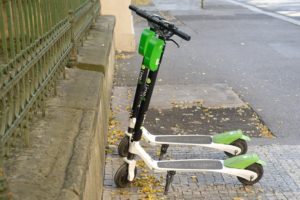
Two major steps toward bringing dockless electric scooters to Pennsylvania and Philadelphia happened this week. Rep. Greg Rothman, R-87th, of Cumberland County and Rep. Stephen Kinsey, D-201st, of Philadelphia introduced HB 631 on Tuesday, that would add electric scooters to the “Special Vehicles and Pedestrians” section of Pennsylvania’s vehicle laws.
Today, Philadelphia City Council held a public hearing on dockless e-scooters and Clean Air Council delivered comments in support of this alternative mode of transportation, along with some of our concerns for how they would be implemented.
Electric scooters have the potential for great environmental benefits, and the Council is excited to see them possibly coming to Philadelphia in the future. The transportation sector in the United States makes up roughly 30% of greenhouse gas pollution, and a large portion of that comes from personal vehicles.
Public transportation, bikes, and walking are well known long-term alternatives to replace car trips, and the Council believes e-scooters are a new low emissions mode and an alternative that may take more cars off the road.
Studies in Cincinnati and Portland show that roughly 1/3 of scooter trips replaced either a personal car or an Uber/Lyft. Motor vehicle congestion is a major contributor to poor air quality in Philadelphia so alternatives to single occupancy vehicle trips must be considered. The Council supports these innovative companies working with the Office of Transportation, Infrastructure, and Sustainability to come up with transportation solutions that will reduce air pollution and the effects of climate change.
The Council believes it is not enough for the e-scooter trips to be low-emission, and believes part of the permit process should be that companies employ sustainable business practices when operating here. Two points are critical. First, the energy sourced for the trips should be renewable either through credits, or through the grid itself. Second, and most importantly, the companies operating in Philadelphia should commit to disposing of their waste sustainably, and recycling all of it.
Sustainable disposal of scooters that are no longer useable is important to the Council since companies turnover their fleet at least annually. No scooters used in Philadelphia should end up in a landfill. The batteries and other electronic components should be dealt with through sustainable e-waste practices, and the other parts of the scooters should be recycled or reused. How these companies deal with this waste is critically important from an environmental perspective.
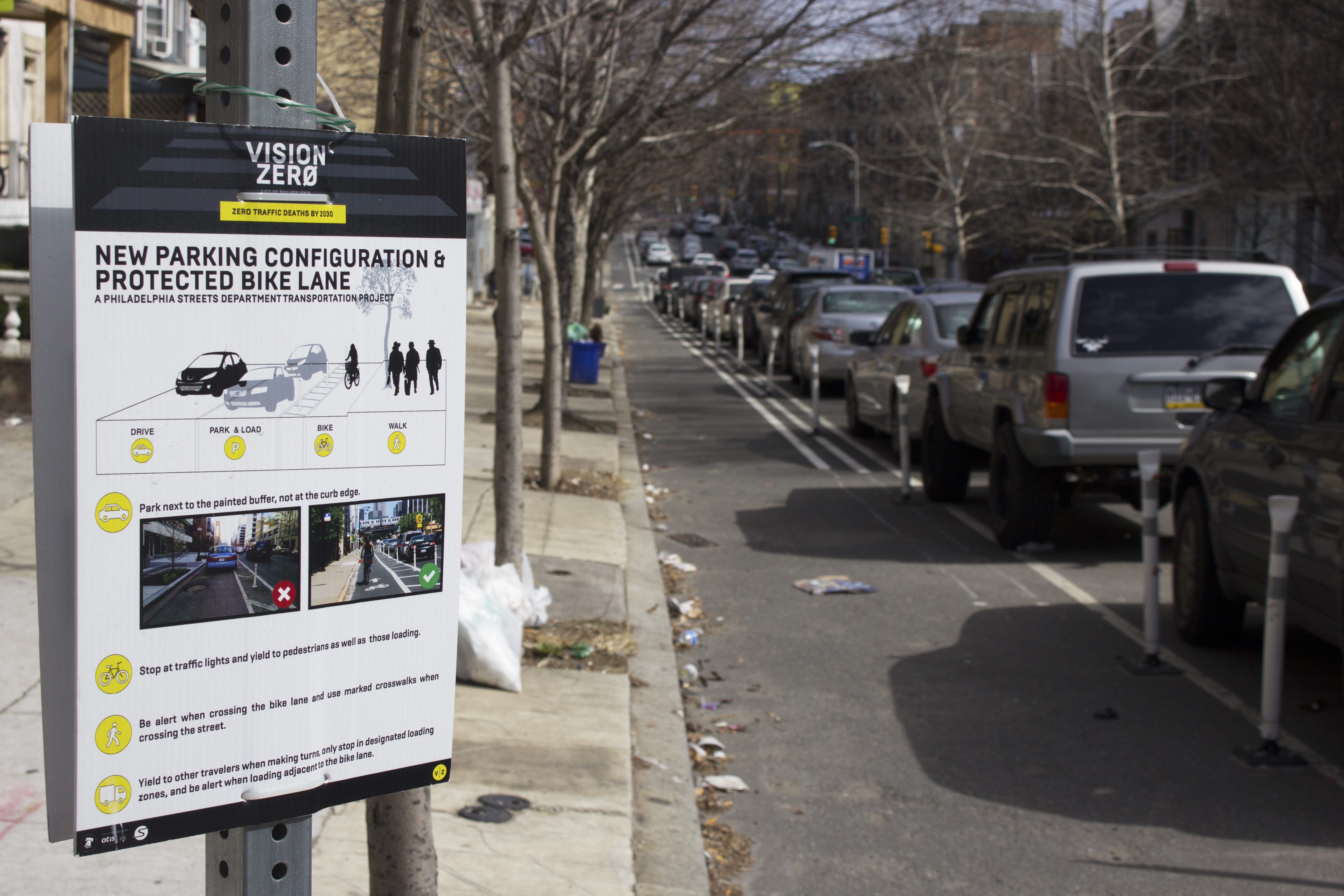
The Council believes e-scooter companies should commit to being part of the city’s Vision Zero goals. Users who feel safe on our streets are central to their business model. This means investing in all of Philadelphia’s alternative transportation modes and contributing to a fund that takes a portion from each ride and puts it toward safe infrastructure.
These funds should be diverted from the General Fund and go to meet the city’s Vision Zero goals either through projects like restriping our roads, installing pedestrian bump-outs, education campaigns, or other engineering projects.
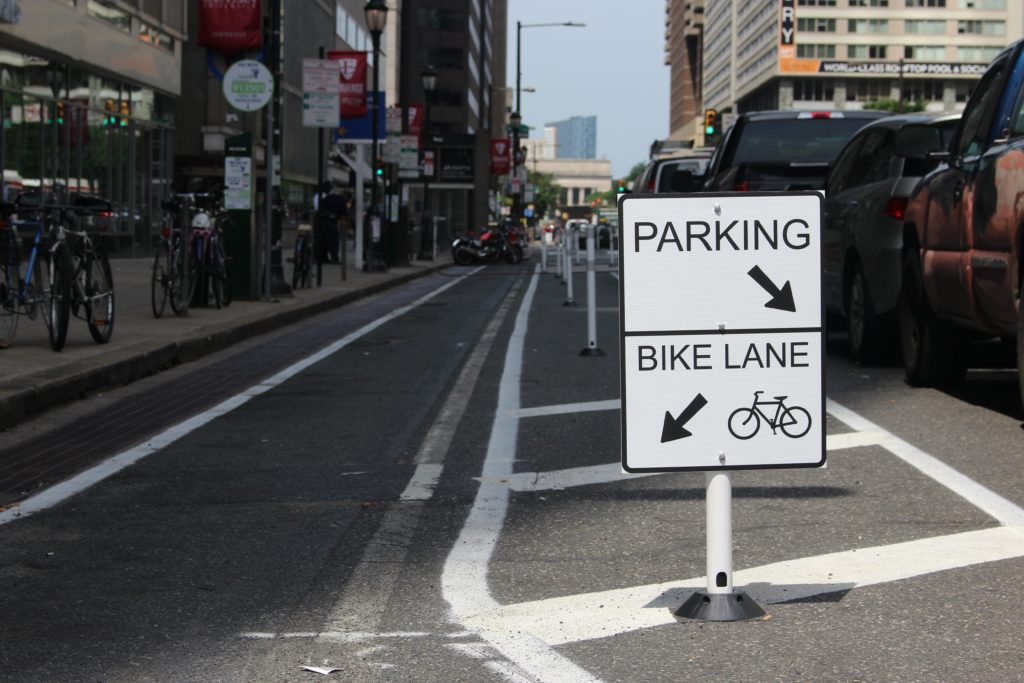
The Council also supports the rights of pedestrians to travel uninhibited on public sidewalks, walkways, and crosswalks and wants to ensure that people follow the law by not riding e-scooters on sidewalks. The best way to protect pedestrians from scooters riding on sidewalks is to create streets that are safe for all users. Safety includes having good policies in place to prevent scooters from inhibiting pedestrians. Enforcement should occur through the e-scooter apps and ensure that rides cannot end until the scooter is parked in an appropriate location that does not inhibit pedestrians.
Equally important to safety and sustainability is equity. These scooters will use public resources to operate, so they should serve all Philadelphians. Other cities require a certain percentage of scooters be placed in low-income and predominantly minority neighborhoods, and Philadelphia should not only do this, but lead the way with the most progressive regulations for equitable re-balancing. This would be in accordance with the demographics of our city. Companies should also be required to accept cash payment and be available to riders who don’t have a smartphone.
While the Council has several concerns about implementing scooters in a way that prioritizes sustainability, safety, equity, and transparency, we believe the city and the companies that want to operate here can address all of these concerns. The Council is excited about any new mode that curbs greenhouse gas emissions – we have a little more than a decade left to make major reductions to avoid the worst effects of climate change, and we cannot afford to miss out on opportunities to electrify a large portion of our transportation fleet.
Click here to read a full transcript of our e scooter testimony
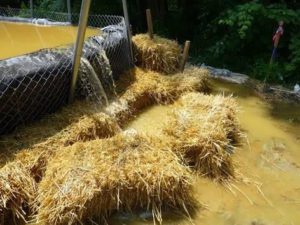
After a slew of legal filings, briefs, and hearings before two different courts, the Environmental Hearing Board, on Monday, April 16th, ordered stronger protocols for responding to and preventing drilling fluid spills on the Mariner East pipelines. Clean Air Council, Delaware Riverkeeper Network, and Mountain Watershed Association took Sunoco and the Pennsylvania Department of Environmental Protection (DEP) to court for violating a previously agreed-upon version of the protocols, and then quietly modifying those protocols without the input of the Council, other organizations, or the court.
The history of these protocols, called the Horizontal Drilling Inadvertent Return Assessment, Preparedness, Prevention and Contingency Plan (or HDD Plan for short) is somewhat complicated. The HDD Plan was originally part of the water permits DEP issued to Sunoco for the Mariner East 2 pipelines in February 2017. In August 2017, after a torrent of drilling fluid spills and drinking water contamination incidents made clear that the February 2017 HDD Plan was failing to protect the public and the environment, Clean Air Council and its partners filed an emergency motion with the court. This resulted in the court shutting down Sunoco’s drilling Mariner East 2 drilling operations until the parties agreed to improvements to the HDD Plan in August 2017. Fast forward six months, and DEP and Sunoco walked back some of those protections in a side agreement. Clean Air Council and its partners filed another emergency filing and have ultimately secured the most protective HDD Plan yet. And this time the stakes are higher if there are further violations.
The new HDD Plan accomplishes several important things. First, it now applies to all drilling methods that could result in drilling fluid spills. Second, professional geologists must be involved in determining whether it is safe to proceed with drilling after a spill. The new HDD Plan lays out specific requirements for what the professional geologist must investigate and present to the DEP. DEP then must find that any plans for continued drilling at the spill site adequately protect the public and the environment before it allows drilling to restart. Groundwater protections have been spelled out in detail so there can be no ambiguity in how they are applied; they are key because of the damage Sunoco’s operations has already caused to drinking water supplies and the continuing nature of that threat. Requirements for notifying DEP and the public about drilling incidents have also been improved.
There will also be increased transparency so landowners and other concerned members of the public will be better able to track any future spills that may arise: Reports prepared by Sunoco’s geologists will be shared with Clean Air Council and its partners. DEP’s documentation of spills on its website will be expanded, made uniform, and include more detail about spill locations–a key piece of information that had previously been missing.
The new HDD Plan is comprehensive, strongly protective, and scientifically rigorous. Perhaps just as important, the Environmental Hearing Board has made it crystal clear that it will not tolerate Sunoco and DEP trying to change it behind the backs of the public again. Even with these improvements, Clean Air Council is under no illusion that the new HDD Plan will be a silver bullet against all future problems and we believe it is still important to keep a watchful eye on construction operations.
You can view the new, April 2018 version of the HDD Plan here
Photo by Faith Zerbe/Delaware Riverkeeper Network

Exactly 17 days passed since Emily Fredricks was struck and killed by a private garbage truck while riding in the bike lane along Spruce Street before another cyclist was again struck by a turning truck while riding in a bike lane. This time the crash occurred near 13th and Pine Streets, just a couple blocks from where Fredricks was killed, and is once again igniting the call for more protected bike lanes throughout Philadelphia.
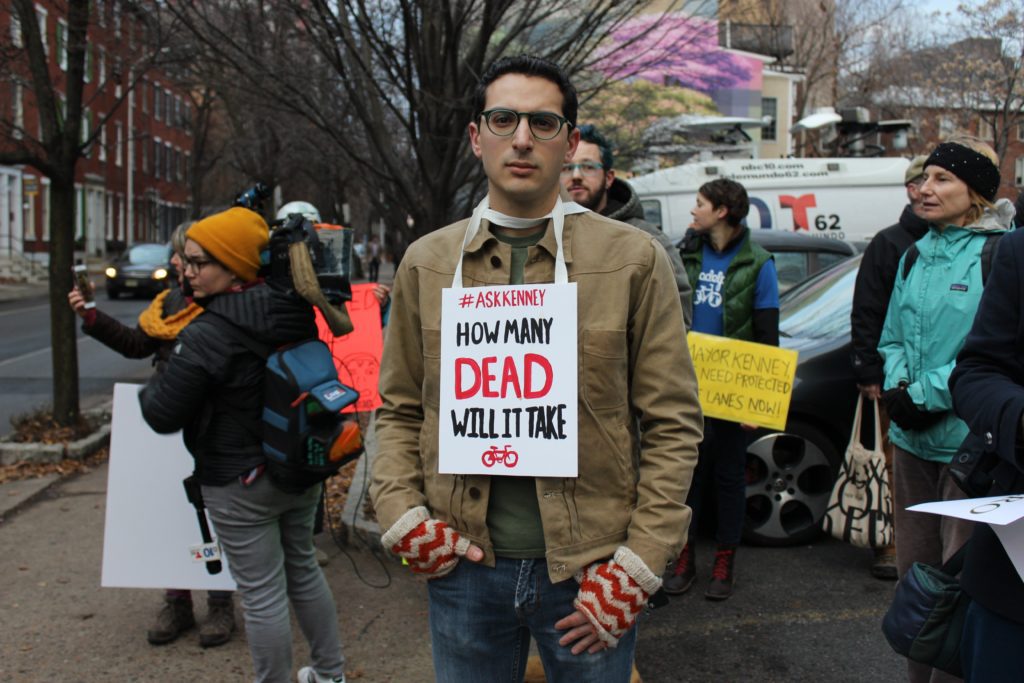
This morning, over 100 people gathered today to again form a human barrier between traffic and the bike lane along 13th Street, and show support for Becca Refford, 24, who was commuting to work when she was hit. Refford waved and smiled at the people who made the human bike lane from her hospital bed via Facetime.
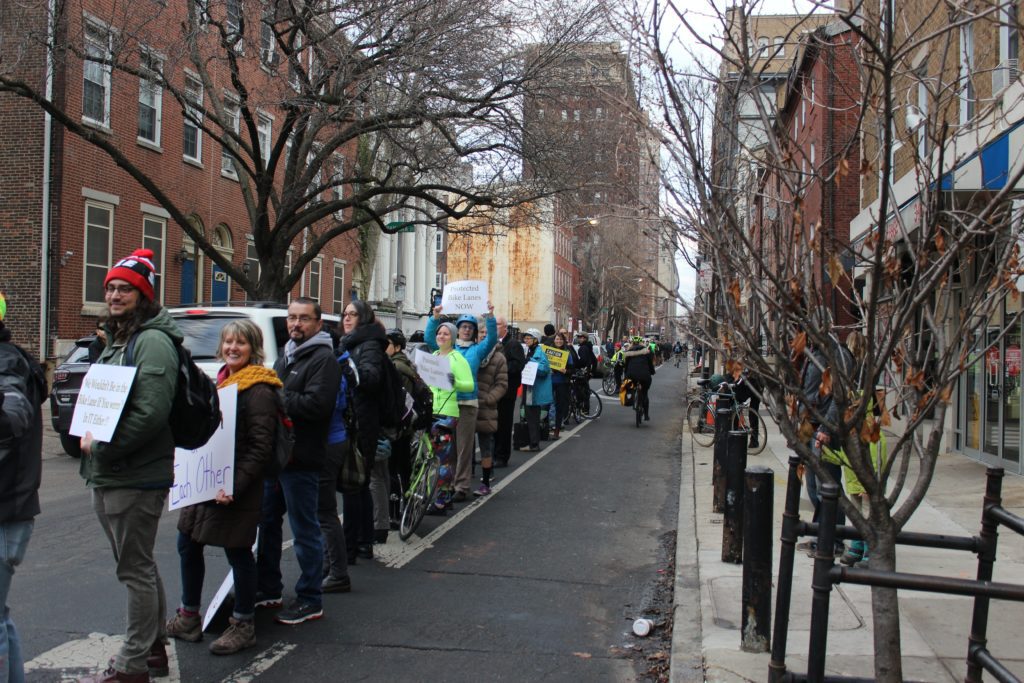
Another serious crash so soon after the death of Emily Fredericks should make clear that paint-buffered bike lanes are not good enough protection on the most used, high traffic streets in Philadelphia.
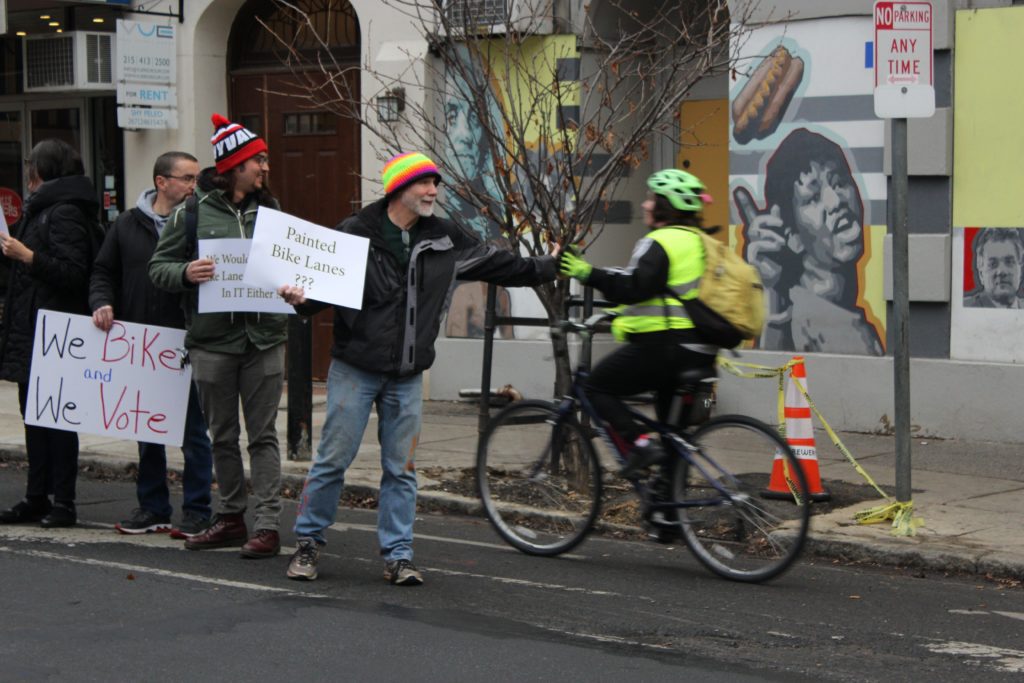
Last week, the City took a small step by committing to a short section of protected bike lanes on South Street and 27th Street near the South Street Bridge. Unfortunately this is a compromise from the original plan to include a protected bike lane along Lombard Street as well.
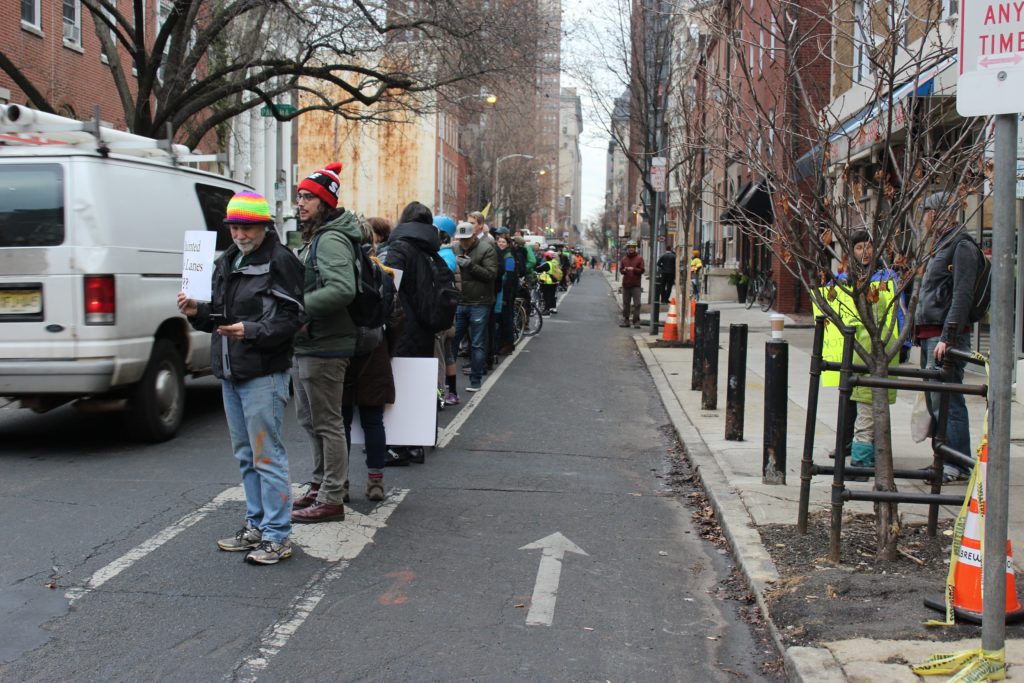
Spruce Street, Pine Street, Lombard, and 13th Street are some of the most highly traveled bike lanes in Philadelphia. It is important that these roads be upgraded from lines of paint to physical barriers, the past three weeks have clearly demonstrated the need. Call Councilmen Kenyatta Johnson and Mark Squilla to thank them for the small addition to the City’s protected bike lane network, and demand that they take further steps to rapidly install protected bike lanes on all of center city’s bike lanes.
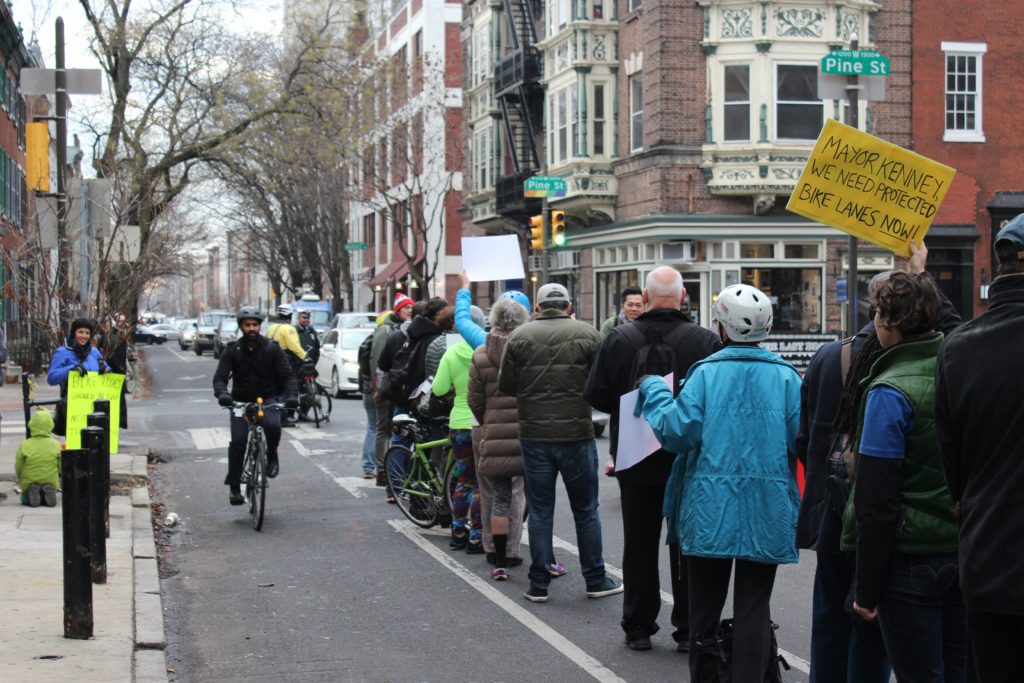
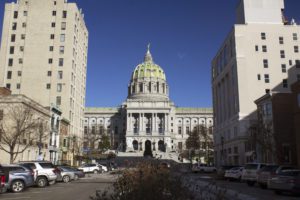
FOR IMMEDIATE RELEASE:
December 14, 2017
Contact:
Justin Wasser, Clean Air Council: 814-242-3156
Impacted Residents, Health Experts and Environmental Advocates Urge Gov. Wolf to Advance Methane Pollution Standards for the Natural Gas Sector
Harrisburg, PA (December 14, 2017)- The Pennsylvania Department of Environmental Protection (DEP) presented today the final draft of permits to control methane pollution from new and modified natural gas operations to the Air Quality Technical Advisory Committee (AQTAC). Residents affected by natural gas operations, as well as environmental and public health advocacy groups from across the Commonwealth, spoke at a press conference and at the AQTAC meeting during the public comment period. The comments were a continuation of advocacy that has spanned three years urging Governor Wolf to fulfill his campaign promises on methane controls. Wolf first promised to cut methane pollution from all new and existing gas operations on the campaign trail in 2014. He announced his methane reduction strategy in January 2016.
Environmental and public health advocacy groups and impacted residents were pleased to finally see progress made on the methane reduction plan at the meeting, but say that the Wolf administration must quickly finalize general permits and require companies to comply with them. Groups raised concerns about the administration’s proposed concepts for weaker rules covering existing source of methane pollution — a major departure from what the governor promised to do.
“While the progress being made on methane standards covering new natural gas sources is encouraging, the Wolf administration must move quickly to regulate existing sources in a similar way,” said Joseph Otis Minott, Executive Director and Chief Counsel of Clean Air Council. “What DEP is proposing to implement on existing sources is the bare minimum required by law. Governor Wolf must go well beyond the bare minimum in protecting the health of Pennsylvania citizens. We elected this governor based on his promises to be a leader in addressing methane pollution and climate change. Pennsylvanians deserve that leadership.”
Methane, a very potent greenhouse gas, is accompanied by air pollutants harmful to human health when it leaks from natural gas operations. Emissions in Pennsylvania continue to rise year after year.
The standards for new and modified sources will be implemented through two general permits, which allow for a streamlined approval process if industry operators agree to adhere to the permit conditions. One permit, GP-5A, covers unconventional gas wells and pigging operations and the other, GP-5, covers processing plants and compressor stations, including those on large transmission pipelines.
“Comprehensive methane rules for existing sources of pollution must be broader in scope and more stringent than the requirements found in EPA guidelines,” said Robert Routh, staff attorney for Clean Air Council. “These guidelines represent the national floor. Governor Wolf and DEP need to lead here and aim much higher for the sake of all Pennsylvanians.”
“The citizens of the commonwealth are suffering needlessly when we have the tools and technology available to greatly limit methane pollution and help clean our air,” said Dr. Robert Little, a family physician and president of the Harrisburg/Hershey chapter of Physicians for Social Responsibility. “It bears emphasizing that we need to clear our air of both toxic hydrocarbons and emissions of methane – reducing one kind of pollution without the other gets us nowhere.”
“Until these new source rules are applied to existing sources, people in my community and others dealing with methane pollution right now are still looking at an unfulfilled promise by Governor Wolf,” said Lois Bower-Bjornson, an impacted resident of Washington County, PA. “I am urging Governor Wolf to be that leader who campaigned on a promise of holding the natural gas industry accountable to the people of Pennsylvania and move forward on rules for existing sources of methane pollution and VOCs immediately.”
“Today, my children and 3,200 of their classmates are attending school next to a gas well pad roughly half a mile away exposing them to a known health and safety risk from oil and gas air pollution including emissions of methane and volatile organic compounds,” said Patrice Tomcik, a mother of two sons from Butler County and a Field Consultant with Moms Clean Air Force, a 1 million member strong organization. “Let’s be clear: This problem will not be resolved unless and until DEP addresses these toxic pollutants like benzene, as well as methane emissions.”

